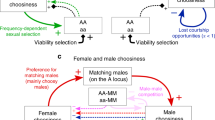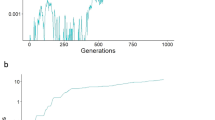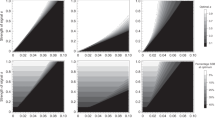Abstract
Sexual conflict occurs because males are selected to produce as many offspring as possible, even if this means lowering the overall reproductive output of individual females. A new model proposed by Gavrilets1 suggests that strong asymmetries between males and females in the costs and benefits of mating will create runaway coevolution between the sexes, promoting rapid divergence between populations and hence speciation. This is an intriguing possibility, not least because it runs counter to existing models2 which suggest that greater sexual conflict will result in males mating more indiscriminately, breaking down reproductive barriers between divergent populations. One reason for this difference is that the new model is based on the idea that females can avoid costs of mating if they are incompatible with some males, whereas we suggest that in reality this may rarely be the case.
This is a preview of subscription content, access via your institution
Access options
Subscribe to this journal
Receive 51 print issues and online access
$199.00 per year
only $3.90 per issue
Buy this article
- Purchase on Springer Link
- Instant access to full article PDF
Prices may be subject to local taxes which are calculated during checkout
Similar content being viewed by others
References
Gavrilets, S. Nature 403, 886–889 ( 2000).
Parker, G. A. & Partridge, L. Phil. Trans. R. Soc. Lond. B 353, 261–274 (1998).
Arnqvist, G. & Nilson, T. Anim. Behav. (in the press).
Holland, B. & Rice, W. R. Proc. Natl Acad. Sci. USA 96, 5083–5088 (1999).
Author information
Authors and Affiliations
Corresponding author
Rights and permissions
About this article
Cite this article
Tregenza, T., Butlin, R. & Wedell, N. Sexual conflict and speciation. Nature 407, 149–150 (2000). https://doi.org/10.1038/35025138
Issue Date:
DOI: https://doi.org/10.1038/35025138
This article is cited by
-
The evolution of reproductive isolation through sexual conflict
Nature (2003)
-
Postcopulatory sexual selection
Nature Reviews Genetics (2002)
Comments
By submitting a comment you agree to abide by our Terms and Community Guidelines. If you find something abusive or that does not comply with our terms or guidelines please flag it as inappropriate.



